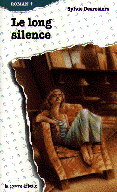


|
Le long silence.
Sylvie Desrosiers.
Grades 11 and up / Age 16 and up. **** /4
|

excerpt:
Quoique... Tu m'as convaincu moi aussi que tu allais bien. Ça faisait même longtemps que je ne t'avais pas vue si en forme. Comment est-ce que tu as pu me mentir à moi aussi? A moi, ton ami d'enfance! Ça ne signifie rien pour toi, toutes les années qu'on a passeées ensemble? Ça n'a pas d'importance, tous nos mauvais coups, tous les bobos qu'on s'est infligeés, tous les films qu'on a regardés dix fois de suite?C'est toi qui m'as montré à embrasse: ça ne t'a rien fait? Moi, je m'en souviendrai toujours, figure-toi, parce que c'est le plus beau, le plus magnifique baiser qu'une fille m'ait jamais donneé!
Je sais, je ne te l'ai jamais dit. Mais tu sauras qu'il y a beaucoup de choses que je ne t'ai jamais dites! Tu as peut-être la palme des mensonges, mais pas celle des secrets! J'en ai, moi aussi, même si je suis un gars.
Un long silence, the third novel by Sylvie Desrosiers written for adolescents, is quite a departure from her humorous mystery novels for children in the series "Notdog", also published by La Courte Echelle. Here, Desrosiers presents an impassioned monologue addressed by Mathieu, who will be 21 in the year 2000, to his best friend, Alice, who had committed suicide the night before.
Desrosiers begins the novel on a note of suspense as it is not clear whether Mathieu is at a hospital bedside or, as it turns out, a funeral chapel. In view of his long friendship with Alice, he has been allowed to sit with her before the official "visiting hours". The chapters are structured by the notation of the time spent at Alice's side: "Treize heures"; "Treize heures dix", etc. and generally conclude with the arrival of flowers from loved ones and acquaintances. Mathieu begins by reminding Alice of their shared childhood and adolescence. The reminiscence inevitably becomes an inquiry into the possible sources of despair in Alice's life: her parents' financial losses leading to their subsequent coldness toward each other (not to mention a decline in lifestyle requiring her to share a bathroom for the first time in her life); her attraction to older men, particularly her professors, which has never brought her the happiness and security she sought; the difficulty of entering her chosen career of theatre; her general despair over violence and pollution in the world. He considers the signs of her distress; for example, her decision to quit the ceégep for a year:
"Tu disais que le dernier geste libre, c'etait justement de deécrocher, de dire non" (p88). Obviously, in committing suicide, she has once again "dropped out", this time saying no to life itself. And yet, Mathieu's life has not been without its difficulties: his father's discovery of his own homosexuality; his parents' divorce; the financial difficulties of the year his father neglected to make support payments; his own anxieties about his sexuality and about the danger of AIDS. Still, he is determined to live and to make a difference in the world: "Il y a tellement de choses à accomplir, Alice" (p94).
As the visiting hour approaches, Mathieu's monologue increases in intensity, reproaching Alice for having given up, for having left her parents with the memory of discovering their daughter after the suicide, for having done this impossible deed to herself and to him: "Ta mère est encore sous le choc. Ton père, je ne sais pas, mais il ne doit pas être trop reluisant. Je suis encore sous le choc moi aussi. Je suis jeune, je vais m'en remettre. Mais eux? Les deétestais-tu au point de leur laisser en souvenir des images qui peupleront leurs cauchemars jusqu'à la fin de leur vie?" (p131). And finally comes a moment of acceptance, an understanding of the fear and lack of confidence that could have led his friend to kill herself. He makes her a pledge: "Je te fais une promesse, Alice. J'arrête de pleurer, disons dans quelques jours. Et après, je rirai le plus possible. Peut-être que, de ton nuage, tu m'entendras et tu sauras que c'est pour toi." (p145).
In this very moving novel, Desrosiers gives an excellent treatment, not without humour, of a difficult subject. Many young readers may find Mathieu's monologue a little slow at times - Un long silence is certainly not for those who like a plot-driven novel. It is, however, destined to provoke much serious discussion about adolescence, the family, love, death and suicide.
Highly recommended.
Kathleen Kellett-Betsos teaches French language and Quebec/French Canadian civilisation and literature at Ryerson Polytechnic University.

To comment on this title or this review, send mail to cm@umanitoba.ca.
Copyright © 1997 the Manitoba Library Association. Reproduction for personal use is permitted only if this copyright notice is maintained. Any other reproduction is prohibited without permission.
Published by
The Manitoba Library Association
ISSN 1201-9364
TABLE OF CONTENTS FOR THIS ISSUE - JUNE 6, 1997.
AUTHORS | TITLES | MEDIA REVIEWS | BOOKSHELF | BACK ISSUES | SEARCH | HOME